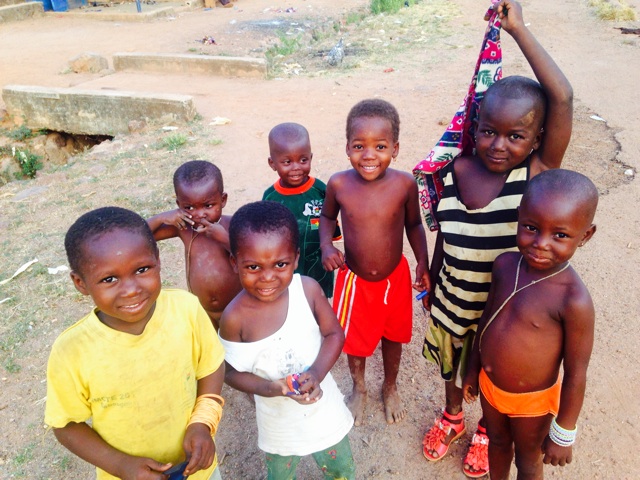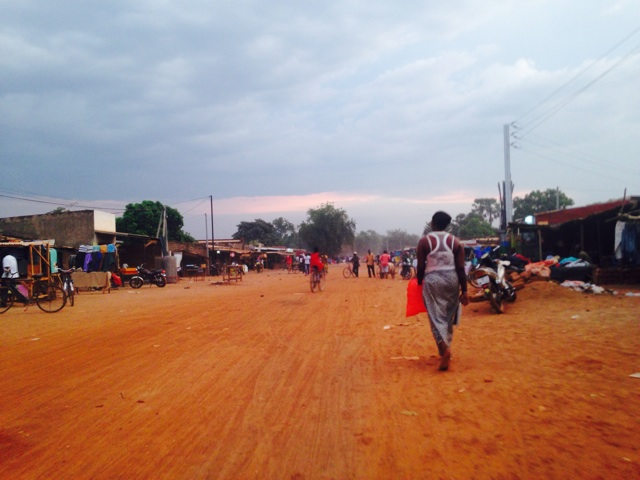ブルキナファソの人は黒人とそれ以外を区別してとらえている。それ以外のことをディエブグでは「とぅばぶぅ」いう。意味的には、白人、といった感じだが、その白人とは白色人種のことではなく、黄色人種も含まれる。色の薄めの黒人のことは「薄い色」と区別しながらも「とぅばぶぅ」とは呼ばないので、黒人の血統じゃなければ全部「とぅばぶぅ」のようだが、「アラブ」は多分「とぅばぶぅ」ではないと思う。
People in Burkina Faso distinguish themselves(Black Africans) from (the)others. Here in Diebougou, they call the others "Tubabu." The meaning of the word is White (people) but this White aren't only Caucasians but other races who aren't black, like me, Asians, are included. They call lighter skinned black "light" but don't call them "Tubabu." In Jula language, "Tubabu-Kan(language)" means French. So the original idea of "Tubabu" would be French people. But anyhow, it seems that everyone who don't come from a Black family is considered "white" = "Tubabu," maybe with the exception of "Arab."
とにかく私はここでは「とぅばぶぅ」だ。「とぅばぶぅ」は金持ちのヨーロッパ人(イメージはフランス)と思われている。普段私はアジア人と呼ばれ、白人と認識されるのはブルキナファソで初体験だよと言っても、「でも日本もヨーロッパでしょう?」と返されたりする。道を歩いているだけで、人々は私を凝視し、子どもたちは嬉しそうに「とぅばぶー!」と叫ぶ。
So, I'm a "Tubabu" here. "Tubabu" are supposed to be rich, and come from Europe. People don't know Japan isn't in Europe. As I walk outside, people stare at me and kids happily shout "Tubabu—!!!"

「とぅばぶぅ」は金持ちと思われているので、たまぁに、道端で私を見るや否や、金をくれと言われることもある。JICAに支給されている月々の生活費は約20万フランセファ、だいたい4万円程度だ。普通に生活するには十分すぎる額ではあるが、金持ちと言われるような額でもない。というのも、ブルキナファソの物価は原地産か輸入かによって大きく変わる。原地の人がやってる簡単な飯屋で一食50円でお腹いっぱい食べれるのに、500mlのオリーブオイルが1000円もする。輸入品の値段は、輸入源の物価プラスアルファで、つまりは幾つもの次元の物価が存在している。輸入品と「とぅばぶぅ」用の高級レストラン(首都)だけで生活しようと思えば、4万円では全然足りない。言ってみれば、そういう次元で生活している人も、いる。
Because "Tubabu" are rich, not very often but sometimes, some people come up to me begging for money. My organization JICA gives me 200,000 FCA, which is about $400, every month as expenses. It's more than enough money to live but I'd say it's not enough amount to make me be considered rich. Prices in Burkina differ a lot depending on if the products are domestic or imported. There are small restaurants run by locals where you can have a meal with 50cents. But if you want to buy a 500ml bin of olive oil, you have to pay $10. The prices of the imported goods are higher than those of the originated countries. So there are different prices existing. If one would want to only use imported goods and eat in the expensive restaurants for "Tubabu", $400 would never be enough. And there are the real rich people who live like that, as well.
一日一家で100円が出せずに腹を空かせる人もいれば、一日1万円使うことも十分可能だ。私自身、こないだ1万円以上するベッドのマットレスを購入したし、家に電気の配線を通すのも1万円ちょっとした。「必要なもの」は人によって大きく違う、というか、そのたった一回の、必要なものを買うお金が、どう考えてもない。ので、いつまでも電気のない家に住む人が大勢いる。じゃあ電気は必要ないのか、というとどうなんだろうか。電気がないと充電もできないし、とりあえず機械類は使えなくなる。私はそれは嫌だな。
Some families cannot afford $1 a day and eat little, but it's possible to spend $100 a day for some few others. Me, as well, I recently bought a mattress of over $100, and to install the electricity to the house, I payed about $100. Each person's "Basic needs" differs, or it's that there are a lot of people who cannot afford to buy what they need, even once in life, they cannot. So they keep on living in a house without electricities. Then, is it that electricity isn't a "basic need"? Without electricities, I cannot even charge my iPhone. I wouldn't want that.
となると、iPhoneとMacBookを持っていて、電気と水道のある家に住んでいて、マットレスで寝ていて、毎日三回食べている「とぅばぶぅ」の私はやはり、裕福だ。ただ、昨日カボレ宅に集う小さな友人たちに話したのは、「とぅばぶぅ」がみんな裕福ではないということだ。例えば中国には一人っ子政策の果てに戸籍上存在すらしていない人間がいる。君がアフリカの貧困について語るなら私はアジアの貧困の話をしましょう、と。
Then, me, a "Tubabu" who has an iPhone and a MacBook, live in a house with electricity and water, sleep on a mattress, and eat 3 times a day, is wealthy. But I said to the teens who hang out at Kabore's house that it's not all the "Tubabu" who are rich. I mentioned some situations of living difficulties in Mainland China. I said, so you talk about poverty in Africa, then I talk about poverty in Asia.
お金の話をする人は多い。特に自分を貧しいと思っている人たちは、アフリカの貧困(という題で自分の話だが)について語りたがるのかもしれない。日本に連れてってよ。とよく言われる。「とぅばぶぅ」の国。どんなイメージなんだろうか。
I met many people here who talk about money. Especially those who think they are poor, they talk about money, and poverty in Africa as they call (but often it's their personal stories.) I'm often asked if I can bring them to Japan. A country of "Tubabu." I have no idea what their images of Japan are like.
教育とはなんなのか。アメリカでディプロマを取った私の、大卒としての常識は、日本のそれとは全然違った。教育を受けたものの知ること、即ち教養、それは国により、文化により、大きく異なる。それは、先進国だとか途上国だとかそんなあいまいなわけのわからない言葉では分けられない。日本を先進国と呼び、西ヨーロッパとアメリカと日本とオーストラリアとニュージーランドをまとめて先進国と呼び、それをまとめて発展と言ってしまうのは、黒人以外を「とぅばぶぅ」と一色たにするくらいに雑な区分ではないかと思うのだが、そんな中で、何が優れていて何が劣っているかを決めるのは、個人でしかないと思っている。
What is education? I've earned my diploma in the states. In Japan, I was surprised by the differences between what I consider as being educated and what people generally consider what that is in Japan. What it means to be educated differs from community to community. There is no such thing as definite good or bad. At least I don't believe that. Then, we'd have to choose what we consider right and wrong.
何を教養と捉えるかは個々によるという大前提の中で、私は一人一人の話をちゃんと聞きたいと思っている。そしてちゃんと話を聞いてもらいたいと思っている。何を伝えたいとかそんな事ではない。ただ、その瞬間瞬間に真摯でありたい。それだけだ。私は最初から最後まで「とぅばぶぅ」だけど、「ミユ」と認識してもらえるように、しっかりと向き合って行きたい。
There is no such thing as superior or inferior. It's just the culture that differs and there is no superiority in cultures. I'd want to listen to each person. I'd like to know what education here is. And I'd want them to listen to me. It's not that there are something I want to tell. It's just that I want to be honest as much as I can in each moment I'm living. From the beginning till the end, I am a "Tubabu" but I'd want to face them with honesty so that they will understand me as "Miyu" instead of a "Tubabu."

ディエブグの中心/ center of Diebougou